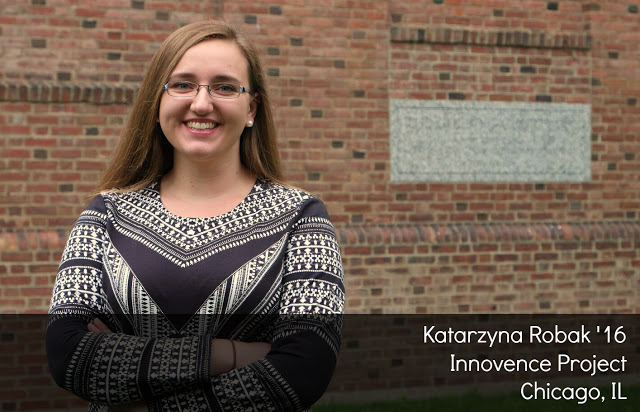- Public Policy
- Leadership
- Funding
- News & Events
- About the Center
Back to Top Nav
Back to Top Nav
Back to Top Nav
Back to Top Nav
 |
| Student Intern: Katarzyna Robak '16 |
Internship Organization:
The Chicago Innocence Center
How would you describe your employer in one paragraph? What’s the elevator pitch?
The Chicago Innocence Center is a non-profit organization dedicated to investigating cases in which prisoners may have been convicted of crimes they did not commit. The Innocence Center does not represent clients in criminal cases, but once an investigation is completed and evidence of innocence gathered, outside counsel may bring that evidence to court. The fundamental goal of the organization is to expose and remedy wrongdoing by the criminal justice system.
What are your specific responsibilities in the organization?
As an intern, I am responsible for a variety of assignments. I am expected to be out in the field investigating the case by interviewing and talking to witnesses who were at the scene of the crime, family and friends of the victim of the crime, the individual convicted of the crime, and various people in the neighborhood who may have some insight. It involves looking through various documents and contacting a private investigator when necessary. I am also expected to attend events in the city related to criminal justice and work on a research project as well. I am currently working on a project with two other interns, and we will be interviewing exonerees.
How did you feel on the first day of your internship?
I was very excited on the first day of the internship. Because I had interned at the organization in the winter, I knew what would be expected of me and what work I would be doing. However, as I came in at the end of June, I was worried that I would not be able to jump into the work right away because I would have to catch up on a lot information. However, the first day went very smoothly and I got to meet an amazing team of interns who immediately made me feel welcome in the group.
What is your favorite part of the internship so far?
The most rewarding part of my internship experience so far has been getting the chance to meet several exonerees. Reading about their experiences of wrongful conviction makes me frustrated at our criminal justice system, but meeting them in person reassured me that while our criminal justice system is not perfect, the work that places like Chicago Innocence Center does makes a difference. At the event, I was able to see exonerees having fun, and our conversations revealed that they choose to enjoy their freedom and avoid being angry at the system that wronged them.
What challenges have you faced so far?
The biggest challenge for me has been staying patient and maintaining a work-life balance. When you know that someone is possibly sitting in prison wrongfully convicted, you want to do everything possible to help this person get out. Unfortunately, investigative work takes time and things do not happen instantaneously. Nonetheless, I want to help as much as I can, and so there have been several times when I continue reviewing documents about the case until late in the night.
Broadly speaking, what do you hope to achieve by the end of your internship?
By the end of the internship, I hope to have a better understanding of the criminal justice system and the impact of wrongful convictions. I would also like the internship to reaffirm my interest in law and in attending law school after graduation.
What have been some practical lessons you've learned in the day-to-day life of your internship?
If there is just a small chance of rain, bring an umbrella with you and keep a sweater with you in case you find yourself in an air-conditioned building or train.
Rockefeller Center-funded interns reflect on their experiences as part of our Notes from the Field series. The Rockefeller Center helps students find, fund, and prepare for a leave-term internship experience in public policy research, public policy analysis, issue evaluation, or activities which help shape and determine public policy.